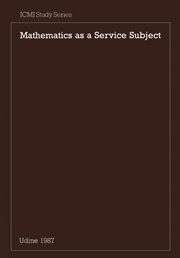Book contents
- Frontmatter
- Contents
- Foreword
- On the teaching of mathematics as a service subject
- What mathematics should be taught to students in physical sciences, engineering, …?
- Mathematics as a service subject – Why?
- Teaching first-year students
- Teaching mathematics to engineering students utilising innovative teaching methods
- Discrete mathematics: some personal thoughts
- Mathematical education for engineering students
- Some reflections about the teaching of mathematics in engineering schools
- Teaching mathematics as a service subject
- A Final Statement
- List of Participants
- Contents of Selected Papers on the Teaching of Mathematics as a Service Subject
A Final Statement
Published online by Cambridge University Press: 26 April 2011
- Frontmatter
- Contents
- Foreword
- On the teaching of mathematics as a service subject
- What mathematics should be taught to students in physical sciences, engineering, …?
- Mathematics as a service subject – Why?
- Teaching first-year students
- Teaching mathematics to engineering students utilising innovative teaching methods
- Discrete mathematics: some personal thoughts
- Mathematical education for engineering students
- Some reflections about the teaching of mathematics in engineering schools
- Teaching mathematics as a service subject
- A Final Statement
- List of Participants
- Contents of Selected Papers on the Teaching of Mathematics as a Service Subject
Summary
Mathematics is of increasing importance in all sciences and in everyday life. It is an essential part of the general culture needed by every citizen in order to understand our world and treat information and data with a critical mind. It is already an essential tool for many professions and will become necessary for many more in the future.
Mathematics has therefore to be taught to many students whom mathematicians have not considered before – to students of subjects as widely differentiated as home economics and biology. Even in the fields where a mathematical education is a tradition – such as physics and engineering – many changes are necessary. Advances in mathematical and computational tools make mechanical techniques and even skills less important than before. Mathematical understanding becomes even more crucial when students and professionals use computers, symbolic manipulation systems, computer graphics and other kinds of new technology. For the same reasons continuing education demands an increasingly important role. The successful design of mathematical courses to meet these needs requires an increased degree of understanding and cooperation between mathematics teachers and those in other disciplines.
All mathematicians must be aware that the future of mathematics as a science depends on the way they respond to these new needs coming from other disciplines and from society as a whole.
- Type
- Chapter
- Information
- Mathematics as a Service Subject , pp. 90Publisher: Cambridge University PressPrint publication year: 1988

